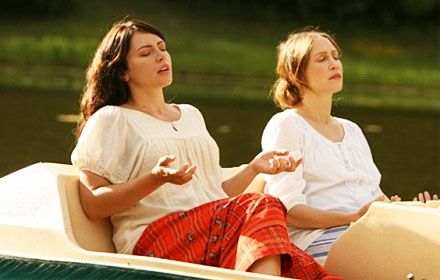Higher Ground Shows Down to Earth Evangelicals
Premiering at June's LA Film Festival, top-notch character actress Vera Farmiga's directorial debut hits the big screens (and arthouses) this week.
It's the story of a shy, curious-about-the-world, and intellectual woman (Farmiga) in the 1970s and '80s (the height of the Religious Right's ascent), raised by disinterested parents and with a wildcat sister, who converts along with her aspiring country-rock musician husband (Joshua Leonard) to fundamentalist Christianity, in search of Higher Ground.
Of special interest to those politically or religiously inclined, the movie offers something almost unique in today's polarized climate: a "narrative" about two committed fundamentalist Christians, with whom an educated audience, even an avowedly Atheist or Agnostic one, can sympathize with.
In our modern media, there seem to be only three flavors in which unapologetically fundamentalist women come in. There are the lipstick-wearing pitbulls like Sarah Palin and Michele Bachmann; the holier-than-thou "Church Lady" moralists like Phyllis Schlafly and Anita Bryant; and the jumping and skipping, frilly-dressed, mascara-weeping camp icons like Jan Crouch and Tammy Faye Bakker. It practically goes without saying that these ladies are largely Kryptonite to educated, Blue State professional women.
But even among their most devoted followers, one gets the sense they are horses of a different color. Most evangelical wives and mothers will never have their own TV shows control national policy. They are what the "dreams of the everyday housewife" are made of, as the country singers would say; the leaders, the validators, the Superwomen they wish they could be, rather than the women they actually are.
Movies and television tend to present "intelligent women" in only a few stereotypes: There's the sassy, designer-dressed diva (think Dana Delany on Body of Proof, or Farmiga's own bravura turn as a no-nonsense, liberated executive in Up in the Air). There's the shy, mousy Marian the Librarian, the kind of glasses-wearing spinster Carrie would've grown up to be. And there's the auto-didactic Debbie Downer -- the humorless, whiny, asexual closet lesbian.
Farmiga not only steers clear of these cliches, she also never loses sight of her character's dignity or intelligence. Farmiga delivers what could have been eye-rolling punchlines like, "Wow, that's so holy!" (watching her best girlfriend speak in tongues) with Meryl Streep or Zoe Caldwell-like conviction. She doesn't approve of her heavy-drinking and coke-using, sexually active sister's lifestyle, but she and her husband still love their "errant, lost" relatives -- they only get on the high horse when it comes to protecting their children.
The movie actually has many moments of lighthearted fun -- these Christians actually have senses of humor, and even active sex lives!
And Joshua Leonard hits a home run as Farmiga's husband and the father of their children. He's not the domineering fundamentalist father who demands absolute "submission" and thinks he always "knows best". Leonard sees himself as having the spiritual "burden" of leadership on his family; his pain and striving is directed within as much as without.
Farmiga's directorial style is adequate, on the level of a Hallmark Hall of Fame without the sappiness, or an indie labor of love (which this film is). If you're a "cinema grammarian" who insists on avant garde visuals and heavy-handed symbolism, you're better off climbing the Tree of Life. But Farmiga excels as an "actor's director".
A few years ago, I was having an online conversation with a colleague and friend, the late and lamented South Dakota-based TV critic Tom Heald, about a recent critics-poll list of the "most underrated" TV shows. Amongst other non-flashy but high-quality shows like Family and Knots Landing was the 1994-2003 CBS mainstay Touched by an Angel. Tom voiced that he didn't care for the show, although it was well-acted and featured thought-provoking stories, because, "it had too much deux ex machina."
I thought Tom was making a joke, but Tom wasn't really kidding. "It's called Touched By An Angel!" I IM'd back, mouth-open. "And you're surprised that it features acts of God? Isn't that like saying that NYPD Blue and CSI shouldn't have all that police work?" "I prefer my Christian religious leaders without the God, thank you," Tom snarked (an inexact quote, but it was to that effect).
It's no spoiler to reveal that Farmiga's character, after running to the church for what Dr. Phil would call her "safe place to land", a world where things made sense and had explanations (even if we don't always understand them), suffers a crisis of faith when her "holy", tongue-speaking best friend suffers a brain tumor. She does everything she's supposed to; doubling down on Bible study and prayer, even going to a psychologist the church referred her to.
But of course, unless someone has degenerated to the point where Donald Duck and Cookie Monster are telling them to kill their children (like Andrea Yates), or they're standing around the homeless shelter babbling nonsense, secular psychiatry is just a godless and useless solution to what are surely Biblical problems. Since the Bible is the inerrant Word of God, the "owner's manual" for the human heart and mind, it always has the answers. It has to.
Instead of getting the personalized therapy she and her husband desperately need, there's just more finger-pointing and self-criticism. And we can see the Iron Curtain slowly ringing down between Farmiga and the God she was counting on to be there for her, just as she always tried to be for Him.
At the end, what gives Higher Ground its worth even to a non-religious audience, is that it is a rags-to-riches-to-rags story, about someone trying to recapture her innocence, only to lose it again, and trying to hang on to what she has left.


